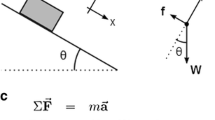Abstract
This paper describes a project in the School of Chemistry at The University of Melbourne. During 1992 thirty hours of videotapes were taken of students doing quantitative volumetric work in first year laboratories. These were viewed to find out what problems students encountered and what interactions they had with other students and with demonstrators. The data were logged on a Hypercard stack and novel visual images were produced to map student activity, both qualitatively and quantitatively. These data contributed to the design of a multimedia learning package which students worked through at the beginning of 1993. Video data of their laboratory performance after this intervention provides evidence of improved performance.
Similar content being viewed by others
References
Arons, A. (1984). Computer-based instructional dialogs in science courses.Science, 224, 1051–1056.
Beasley, W.F. (1979). The effect of physical and mental practice of psychomotor skills on chemistry students' laboratory performance.Journal of Research in Science Teaching, 16, 473–479.
Butler, W. & Griffin, H. (1979). Simulations in the general chemistry laboratory with microcomputers.Journal of Chemical Education, 56, 543–545.
Gardner, P. & Gauld, C. (1990). Labwork and students' attitudes. In E. Hegarty-Hazel (ed.)The student laboratory and the science curriculum. London: Routledge.
Gomoll, K. (1990). Some techniques for observing users. In B. Laurel (ed.)The art of human-computer interface design. Reading, MA: Addison-Wesley.
Hegarty, E. (1978). Levels of scientific enquiry in university science laboratory classes: implications for curriculum deliberations.Research in Science Education, 8, 45–57.
Hegarty-Hazel, E. (1990a). Technical skills. In E. Hegarty-Hazel (ed.)The student laboratory and the science curriculum. London: Routledge.
Hegarty-Hazel, E. (1990b). Life in science laboratory classrooms at tertiary level. In E. Hegarty-Hazel (ed.)The student laboratory and the science curriculum. London: Routledge.
Kempa, R.F. & Palmer, C.R. (1974). The effectiveness of videotaped recorded demonstrations in the learning of manipulative skills in practical chemistry.British Journal of Educational Technology, 5, 62–71.
Neerinck, D. & Palmer, C.R. (1977). The effectiveness of videotaped recorded demonstrations in the learning of manipulative skills in practical chemistry. Part II.British Journal of Educational Technology, 8, 124–131.
Prosser, M. T. & Tamir, P. (1990). Developing and improving the role of microcomputers in student laboratories. In E. Hegarty-Hazel (ed.)The student laboratory and the science curriculum. London: Routledge.
Runquist, O. (1979). Programmed independent study, laboratory technique course for general chemistry:Journal of Chemical Education, 56, 616–617.
White, R. T. (1979). Achievement, mastery, proficiency, competence.Studies in Science Education, 6, 1–22.
Woolnough, B. & Allsop, T. (1985).Practical work in science. Cambridge: Cambridge University Press.
Author information
Authors and Affiliations
Additional information
Specializations: academic development in the sciences, evaluation of computer-based learning materials.
Specializations: physical chemistry, chemical education at tertiary level.
Specializations: design and development of computer-based learning materials.
Specializations: electrochemistry, general physical chemistry at secondary and tertiary level.
Specializations: chemical education at secondary and tertiary level, theoretical chemistry.
Rights and permissions
About this article
Cite this article
McNaught, C., Grant, H., Fritze, P. et al. Improving quantitative volumetric analysis skills in first year university chemistry courses. Research in Science Education 23, 189–198 (1993). https://doi.org/10.1007/BF02357060
Issue Date:
DOI: https://doi.org/10.1007/BF02357060




